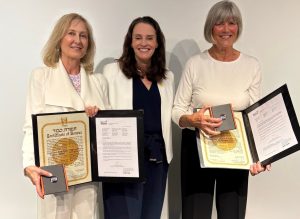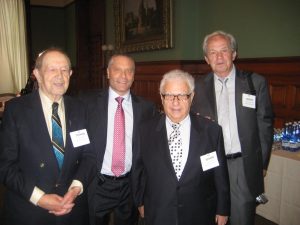Two days before she flew to Israel with her documentary crew, Rebecca Snow received some news that would drastically change her visit. For the past year, she and her producers had been trying to track down a baby that a teenage boy found in the Ukrainian woods during the Holocaust. Snow wanted to reunite the boy – who grew up to be Maxwell Smart, an artist who now lives in Canada – and the baby, whom Smart hadn’t seen in 75 years, and capture the whole thing on film.
Two days before they all flew to Israel, Snow heard from an Israeli investigator: they’d found the baby.
“I’ve been in this business for 20 years and it’s one of those documentary moments you just dream of,” Snow recalls of the reunion between Smart and the orphan. “It helped him deal with these feelings that he’s had since he was 16 years old.”
Viewers can see this catharsis unfold in real-time in Cheating Hitler, which will air on the History Channel on Nov. 11.
It was the TV network that first approached Snow and her producer, Steve Gamester, with the idea of an hour-long documentary about the Holocaust for its annual Remembrance Day programming. Canadians are used to documentaries about the great wars, the network’s executives believed, but they’re less familiar with the Holocaust. In an era of rising anti-Semitism and survivors dying off, the timing seemed perfect for telling a unique Holocaust story.
READ: SOME HOLOCAUST DOCS ADD LITTLE TO THE CONVERSATION
Snow and Gamester decided to tell the stories of child survivors whose trauma, in part, stems from “penetrating, unanswered questions that they’re haunted by,” Snow says. “We wanted to take the survivors on some kind of journey.”
For Smart, that journey led him to Israel. But he is just one of three Canadian survivors profiled in Cheating Hitler. Rose Lipsyzc, with her grandchildren, revisits the killing fields where her parents were murdered, and the film crew introduces Helen Yermus to the brother of a friend who died beside her after the war.
“My brother was taken from my arms, literally,” Yermus tells The CJN. He died in a concentration camp, but after that, she befriended a girl who also had a brother – a brother roughly the same age as Yermus’. Her friend died, but that brother survived somewhere. The scenario created an opportunity for Snow and Gamester to deliver some kind of closure in Yermus’ life. “I’ve always wondered what happened to that little boy,” she says.
In the film, Snow captures the moment that little boy – now an old man – walks into Yermus’ condo in Toronto. Seeing the ghosts of their late siblings in each others’ tearful eyes, they immediately embrace.
“It’s an incredibly moving moment in the film,” Snow says.
Once she and her team began researching and discovering clues, Snow told the History Channel this was going to be bigger than any of them realized. The final product runs 88 minutes, interweaving these three survivors’ testimonies with moving animations and on-the-ground detective footage from Ukrainian forests, revitalized Polish towns and a former Lithuanian ghetto.
“These survivors don’t know each other – never meet – but their stories have all these echoes between them,” Snow says. “I’m so thankful to them for letting me tell their stories.”
The three survivors, as well as the director and producer, will all attend a special debut screening of the film on Nov. 6 at the TIFF Bell Lightbox theatre in Toronto, followed by a Q-and-A. The movie will debut nationally on the History Channel on Nov. 11 at 9 p.m. EST.
Author

Michael is currently the director of The CJN's podcast network, which has accumulated more than 2 million downloads since its launch in May 2021. Since joining The CJN in 2018 as an editor, he has reported on Canadian Jewish art, pop culture, international travel and national politics. He lives in Niagara Falls, Ont., where he sits on the board of the Niagara Falls Public Library.
View all posts







